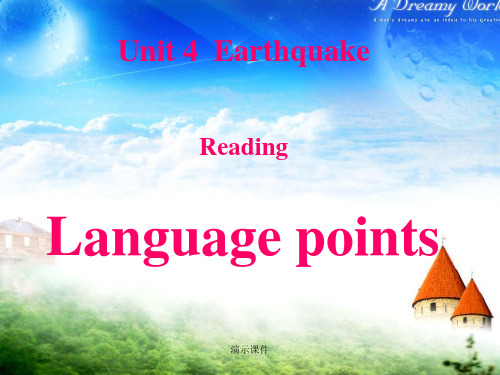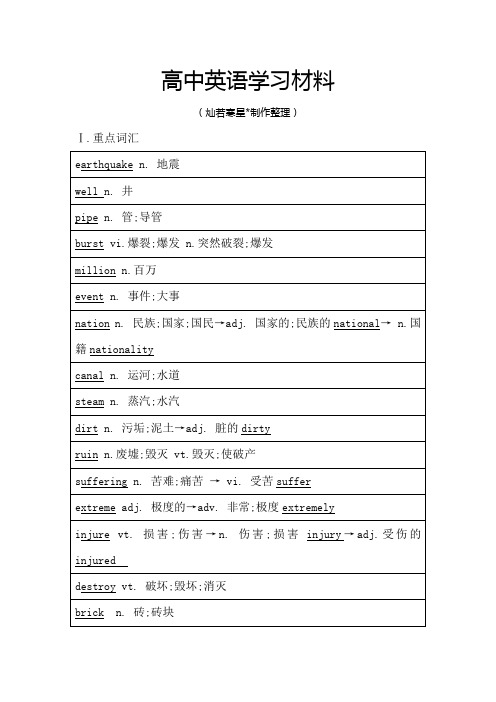人教版高中英语必修一第四单元汇总
高一英语必修一Unit4知识点归纳.ppt

=All of them burst into laughter/tears/songs.
burst out +v-ing :suddenly begin doing sth
扩展: burst into leaf burs into flower
长出叶子 开花
n. a burst of ...一阵... a burst of laughter /thunder /applause(欢呼)
by the end of in the end ★at the end of “在…尽头;在…末” ★by the end of “到/截止……末”;主句一般用完成 时 ★in the end 意思“最后、终于”= at last/ finally 1. Wash your hands ___a_t_t_h_e_e_n_d__o_f__ the experiment.
2. To tell you the truth, I __t_h_in_k__p_o_o_rl_y_o_f_ Tom, who is very lazy and never knows what to do .
5. It seemed as if the world was at an end.
演示课件
“too…to…”结构之前带有only,but,never,not,时, 是强调肯定的表示法,译作“非常……”“十分…” “实在……””真是太……”等
I am only too happy to teach you. 我非常高兴教你们。
He is but too glad to do so 他非常喜欢这样做
1. The city _l_a_y_/_w_a_s_i_n_r_u_i_n_s (成为废墟)after
人教版高中英语高一人教版必修一第四单元课件

1
Strange things were happening
in the countryside of northeast
Hebei.
beginning
2
Everything began to shake.
It seemed as if the world was
at an end.
beginning
3
Everywhere they looked nearly
everything was destroyed.
beginning
4
All hope was not lost.
beginning
19
Detailedreading
20
Fill in the blanks
Main Idea
Details
were injured . Then later that afternoon,
another big quake shook Tangshan.
People began to wonder
how long the disaster would last . But all
hope was not lost . Soldiers came to help
24
Skimming
Read the text aloud and join the correct parts of the sentences.
1 The chickens didn’t eat because
2 Before the earthquake the people didn’t worry because
drought
人教版高中英语必修1unit4课文知识点详解

3.burst
In the city,the water pipes in some buildings cracked and burst .(回归课本P26) 观察思考 The excellent performance of Chinese
competitors at the 29th Beijing Olympic
1 .Thousands of families were killed and many children were left without parents.成千上万 个家庭遇难,许多孩子失去了父母。 考点提炼 此处leave表示“使处于„„状态 ”, 其后通常接复合宾语,即宾语加形容词、过去分 词、现在分词、介词(短语)等作宾语补足语。
ruin oneself自取灭亡
ruin one’s health/fame毁坏某人的健康/名誉
易混辨异
destroy,ruin,damage,break,spoil (1)destroy常指彻底的、不能或很难修复的“破 坏,毁坏”,程度较深;也可用于损坏抽象的东 西,比如名誉、计划、努力、契约等。
4.The army organized teams to dig out those
who were trapped and to bury the dead.部队 组织人员挖出被困者,掩埋死者。 考点提炼 the dead意为“死者”。“the+形容词 ” 常表示一类人,作主语时,谓语动词要用 复数
Ⅱ.重点短语再现
1. at an end 结束;终结 2. as usual 照常 3. dig out 掘出;发现;找出 4. be known as 作为„„而闻名
5.be covered by
人教版高中英语必修一Unit4Part1重点词汇

高中英语学习材料(灿若寒星*制作整理)Ⅰ.重点词汇earthquake n. 地震well n. 井pipe n. 管;导管burst vi.爆裂;爆发 n.突然破裂;爆发million n.百万event n. 事件;大事nation n. 民族;国家;国民→adj. 国家的;民族的national→ n.国籍nationalitycanal n. 运河;水道steam n. 蒸汽;水汽dirt n. 污垢;泥土→adj. 脏的dirtyruin n.废墟;毁灭 vt.毁灭;使破产suffering n. 苦难;痛苦→ vi. 受苦sufferextreme adj. 极度的→adv. 非常;极度extremelyinjure vt. 损害;伤害→n. 伤害;损害injury→adj.受伤的injureddestroy vt. 破坏;毁坏;消灭brick n. 砖;砖块dam n. 水坝;堰堤track n.轨道;足迹;痕迹useless adj. 无用的;无效的;无益的→adj. 有用的useful shock vt.& vi.(使)震惊;震动 n.休克;打击;震惊→adj. 震惊的shocked→adj.令人震惊的shockingrescue n.& vt. 援救;营救trap vt. 使陷入困境 n.陷阱;困境electricity n. 电;电流;电学→adj. 用电的,与电有关的,发电的electrical→adj.电子的;电子操纵的electronicdisaster n. 灾难;灾祸bury vt.埋葬;掩埋;隐藏mine n. 矿;矿山;矿井→n. 矿工minershelter n. 掩蔽;掩蔽处;避身处title n.标题;头衔;资格reporter n.记者→vt. 报告reportright away立刻;马上as if 仿佛;好像at an end 结束;终结in ruins 严重受损;破败不堪dig out 掘出;发现a (great ) number of 许多;大量的。
【人教版】高中英语必修一Unit-4单元知识点

必修一Unit4 Earthquakes1、In the city, the water pipes in some buildings crashed and burst. 城市里,一些大楼里的水管爆裂。
burst爆裂,突发The square is bursting with tourists。
广场上到处都是游客。
I felt as if my heart would burst with joy。
我觉得自己高兴得心花怒放。
The police burst through the door。
警察破门而入。
There was a burst of laughter in the next room. 隔壁房间里突然爆发出一阵笑声。
联想扩展:(1) burst in on…突然打断He burst in on our conversation. 他突然打断了我们的谈话。
(2)burst into +n。
突然…The speaker burst into angry speech. 演讲者突然讲粗话.(3) burst out + doing突然…The woman burst out crying like a child. 那个妇女突然像小孩一样哭了。
(4)burst to do sth. 迫切想做某事I am bursting to tell you the news. 我迫不及待的想告诉你这个消息。
2、But the one million people of the city,who thought little of these events, were asleep as usual that night。
但是认为这没什么的一百万城里人,那天晚上还像往常一样睡觉。
affair,event,accident,incident,matter, businessaffair 指要做的事或已经发生的事。
高一英语必修一Unit4单元(人教版)精选教学PPT优质课件

发动机的电故障 an _e_l_e_c_tr_ic_a_l_ fault in the engine
电气工程师 an __e_l_e_c_tr_ic_a_l___ engineer 电子计算机 an __e_l_ec_t_r_o_n_ic__ computer
be shocked to do
高考总复习·人教版·英语
高考总复习·人教版·英语
Unit 4 Earthquakes A Night the Earth Didn’t Sleep
Ⅰ.写出下列必考单词
高考总复习·人教版·英语
1.轨道,足迹,痕迹 n.___t_r_a__c_k____
2.蒸汽 n._____s_t_e__a_m__
抢救队 a rescue team 来/去援救某人come to one‘s
Ⅱ.写出下列单词的变化形式
1.破坏,毁坏,消灭v.__d_e_s_t_r_o_y;
高考总复习·人教版·英语
破坏,毁坏n.__d_e_s_tr_u__c;tion
destructive
破坏性的,毁灭性的adj._d_e_s_t_r_u_c_tive effect/impact/
2.使惊吓,吓唬v.__f_r_ig__h_t_e;n
once)
3.It seemed that the world was _a_t _a_n__e_n_dwhen he
learned that all his savings were gone. (dead,finished)
4.The earthquake left the whole city ___i_n_r_u_i_n_s__.
6.Shwe _a_s_s_h_o_c_k_etdheantews that her husband was
人教版高一英语必修1Unit4全套课件
人教版高一英语必修一unit4知识点讲解
人教版高一英语必修一unit4知识点讲解Unit 4 Knowledge Points ExplanationUnit 4 of the People's Education Edition for Grade 11 English textbook covers various knowledge points related to the theme of "Earthquakes". In this unit, students will acquire a deeper understanding of earthquake-related vocabulary, grammar structures, and reading skills. Without further ado, let us delve into the essential concepts covered in this unit.I. Vocabulary1. Earthquake-related vocabulary: In this section, students will learn key earthquake vocabulary such as tremor, magnitude, epicenter, seismograph, and aftershock. It is crucial to have a firm grasp of these terms to effectively communicate and understand information about earthquakes.2. Synonyms and antonyms: This module aims at enhancing students' lexical range by exploring synonyms and antonyms of common words. By learning synonyms and antonyms, students canimprove their ability to express ideas in a more nuanced and precise manner.II. Grammar1. Passive voice: Unit 4 focuses on the use of passive voice. By understanding and practicing the construction of passive sentences, students can accurately convey earthquake-related information, such as "The city was devastated by the earthquake."2. Attributive clauses: This section introduces attributive clauses, or relative clauses, which provide additional information about a noun. Students will learn how to use relative pronouns (who, which, that) to modify nouns in their writing and speaking.III. Reading Skills1. Skimming and scanning: Skimming and scanning are two essential reading skills that help students quickly locate relevant information in a text. Students will learn how to skim and scan passages about earthquakes to extract key details and main ideas efficiently.2. Understanding text structure: This module focuses on recognizing different text structures, such as cause and effect, compare and contrast, and problem and solution. By familiarizing themselves with these structures, students can better understand the organization of a text and extract relevant information more effectively.IV. Writing Skills1. Descriptive writing: In this part, students will develop their descriptive writing skills by describing earthquakes and their impact. They will learn how to use vivid language and sensory details to create a more engaging and informative description.2. Paragraph organization: This module emphasizes the importance of coherent paragraph organization. Students will learn how to structure paragraphs logically, ensuring a smooth flow of ideas and providing clear topic sentences and supporting details.V. Listening and Speaking Skills1. Note-taking in lectures: This section focuses on effective note-taking skills during lectures. Students will practice listening to earthquake-related information and summarize the key points in their own words.2. Group discussions: Students will participate in group discussions on various topics related to earthquakes. This activity aims to improve their ability to express opinions, engage in meaningful conversations, and collaborate with peers.In conclusion, Unit 4 of the People's Education Edition for Grade 11 English provides comprehensive knowledge points that enable students to expand their vocabulary, enhance grammar skills, improve reading comprehension, develop writing proficiency, and strengthen listening and speaking abilities. By mastering these knowledge points, students will be better equipped to comprehend and discuss earthquake-related topics, both academically and in real-life situations.。
高一英语新人教选择性必修一知识点盘点 Unit 4
高一英语新人教选择性必修一知识点盘点
Unit 4
课文基础知识点
- 词汇:
- 单词: 通过掌握本单元的核心词汇,能够更好地理解和阅读课文。
- 词组: 了解和掌握常用的词组,提升语言表达的准确性。
- 重点句型: 研究和记忆课文中的重点句型,能够在写作和口语表达中灵活运用。
课文内容掌握
- 主题: 了解课文的主要主题和核心内容。
- 段落划分: 分析课文的段落结构,理解每个段落的主旨和逻辑关系。
- 细节理解: 阅读课文,准确理解并能回答与课文内容相关的细节问题。
阅读与写作能力提升
- 阅读技巧: 使用合适的阅读技巧,如扫读、略读和详读等,提
高阅读理解能力。
- 写作技巧: 研究并掌握与课文相关的写作技巧,如写作观点陈述、事实引用和推理论证等。
课文拓展知识点
- 文化背景: 了解课文中涉及到的文化背景和相关的国家或地区
背景知识。
- 拓展阅读: 阅读其他相关文献或材料,拓宽知识面,提升英语
阅读能力。
- 同义词和近义词: 研究并掌握与课文相关的同义词和近义词,
丰富词汇量和语言表达能力。
以上是关于《高一英语新人教选择性必修一知识点盘点Unit 4》的内容总结,希望对你的学习有所帮助。
(新教材)人教版 2019 高中英语选择性必修一 第四单元(知识点总结全)
Unit 4 Body Language 一、常见短语表示“看”的相关短语stare at 凝视盯着看glance at 匆匆一看瞥一眼glare at 怒视ashamed的常用短语be ashamed of 为…感到难为情为…感到尴尬be ashamed to do sth 耻于做某事不情愿做某事be ashamed that… 对…感到愧疚adjust的常用短语adjust…to… 整…以适应... adjust to (doing) sth 适应于…adjust oneself to 使自己适应于... differ的常用短语differ in 在…(方面)不同differ from 与…不同differ with sb on/over sth 在某事上与某人有不同之处react的常用短语react to sth 对…做出反应react against 反对… 反抗…react on/ upon 对…产生影响react with 与…发生化学反应employ的常用短语employ sb as… 雇用某人当…employ sb to do sth 雇用某人做某事be employed in doing sthemploy oneself in doing sthoccupy的常用短语occupy sb/oneself in doing sth/with sth 使某人/自己忙于(做)某事be occupied in doing sth/with sth 忙于(做)某事favour的常用短语do sb a favourdo a favour for sb in favour of 支持…ask sb for a favour ask a favour of sbvary的常用短语vary from 不同于vary from…to... 从…到…有所变化vary between...and... 在…和…之间变化vary with 随…而变化vary in sth (大小、形状等)不同有别call的常用短语call on/at 拜访(on后跟人;at后跟地点名词)叫号召要求call for 要求提倡call in 召集来访call off 取消延期call up 给…打电话使回忆起征召(入伍)break的常用短语break down (机器)损坏破坏出故障失败垮掉分解break in 闯入打断插嘴break into 闯入break out (战争、火灾等)爆发break up 分散拆散驱散破裂break off 拆开折断break away from 脱离打破word的常用短语in other words 换句话说have words with sb 与某人吵架have a word with sb 和某人说话beyond words 无法用言语表达break one’s word 食言keep one’s word 信守诺言in a word 总之简言之word for word 逐字地distinguish的常用短语distinguish between A and B 区别A和B distinguish...from... 把…从…区别开来distinguish oneself (as) ... 作为…而出名be distinguished for 因…而出名请求某人帮忙帮某人的忙从事某事忙于做某事二、易混词(组)辨析1. employ, hire, rent①employ:长时间“雇用”,宾语多是人。
